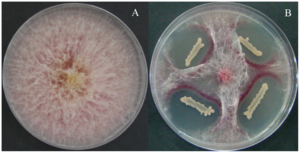Bacillus subtilis (antagonist)
| Literature database |
|---|
| 429 articles sorted by: |
| • year (descending) |
| • research topics |
| • countries/regions |
| • list of pathogens |

Author(s): Yueju Zhao, Jonathan Nimal Selvaraj, Fuguo Xing, Lu Zhou, Yan Wang, Huimin Song, Xinxin Tan, Lichao Sun, Lancine Sangare, Yawa Minnie Elodie Folly and Yang Liu
Source: PLoS ONE, 2014, 9 (3) e92486
Bacillus subtilis (antagonist) Ehrenberg, Cohn
The bacterium is a Gram-positive, rod-shaped bacterium which is widespread in the environment and known as an efficient antagonist against other organisms like fungi or bacteria. It is marketed in various products. In agriculture it is usually applied as seed treatment and generally promotes plant health and improves resistance to various plant diseases, mainly those caused by plant pathogenic fungi and bacteria. Even medical preparations are available against gastrointestinal and skin infections. Few negative effects are known.
For a review of B. subtilis promoting plant growth as well as controlling plant pathogens see Blake et al. (2021).
Note: This page deals only with strains antagonistic to plant diseases, for other strains see
- Other images of Musca domestica (Wikimedia Commons - click to enlarge)


